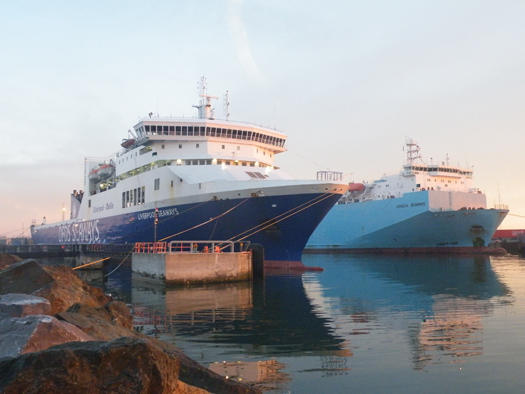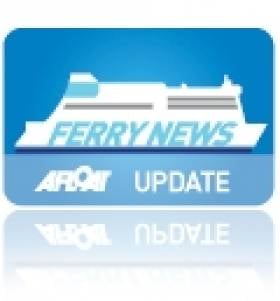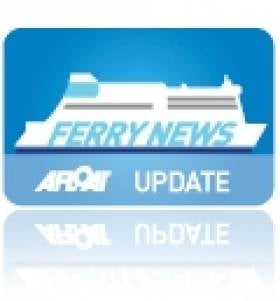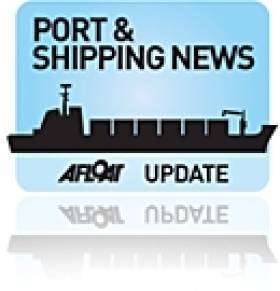Displaying items by tag: Lagan Seaways
Irish Authorities Approve Stena / DFDS Merger
Of the two services, the Belfast-Liverpool (Birkenhead) is for passengers and freight while the and Belfast-Heysham port route is exclusively for freight-only users. To read more about the decision from the authority click here.
In February the UK's Office of Fair Trading (OFT) referred Stena AB's acquisition from DFDS A/S to the Competition Commission, conclusions on the report are not expected to be made until 25 July. To read more about the merger click here.
In the meantime the Belfast-Liverpool (Birkenhead) route continues trading under the name of Stena Line Irish Sea Ferries Ltd which is separately operated to Stena Line's other Irish Sea routes.
Sailings on the 8-hour route are run by the Italian built 27,510 tonnes ro-pax twins Lagan Seaways and Mersey Seaways which have been in service since the newbuilds were launched in 2005.
As the acquisition remains subject to regulatory clearance, passengers intending to travel on the route can continue to make bookings through the DFDS Seaways website by logging onto this link.
In addition the acquisition involved the sale of the South Korean built freight-ferries Hibernia Seaways and Scotia Seaways which operate Belfast-Heysham sailings.
DFDS Seaways Makes Final Irish Sea Departure
The ro-pax Dublin Seaways made a last crossing with a Saturday morning arrival at Birkenhead. After disembarking passengers, vehicles and freight traffic, the 21,856grt vessel immediately departed the Mersey for a short-term deployment on the company's North Sea Rosyth-Zeebrugge service.
Sistership, Liverpool Seaways also completed her last crossing to Birkenhead with an overnight Saturday sailing. This was the final scheduled sailing under DFDS Seaways ownership and marked the last foot-passenger crossing on the Liverpool route as rival operators P&O (Irish Sea) and Seatruck Ferries do not cater for this market.
The vessel returned to Dublin yesterday from Birkenhead; this was to facilitate the loading of drop-trailers and terminal based tugmasters (engine-driven truck/cabs) that tow unaccompanied trailers on the roll-on roll-off vessels. After a short turn around at the terminal, Liverpool Seaways departed Dublin, bound for Immingham. The UK east coast port is where DFDS operate an extensive freight route network across the North Sea.

The ro-pax Liverpool Seaways and freight-ferry Anglia Seaways berthed in Dublin Port yesterday prior to sailing away from the Irish Sea. Photo Jehan Ashmore / ShipSNAPS
In addition the 13,704grt Anglia Seaways also docked in Dublin yesterday from Heysham to perform similar duties like the Liverpool Seaways. Several hours later, the 114-trailer capacity vessel set a southbound course past The Muglins, bound for Avonmouth.
DFDS cited its decision to exit entirely from Irish Sea sector due to the sharp decline in the Irish and UK economies in 2008 and 2009. The company suffered continuous losses on its remaining routes and the issue of over-capacity, particularly on the north Irish Sea.
Only last December, the Danish owned shipping operator sold its other two Irish Sea routes to Stena Line in a £40m acquisition deal. This is all the more remarkable considering DFDS Seaways purchased the previous route operator, Norfolkline's Irish Sea division of their four routes and seven vessels, in July 2010.
The sale to Stena covered the three terminals used on the Belfast routes to Birkenhead and Heysham, which is another freight-only service. In addition the acquisition involved the sale of the South Korean built freight-ferries Hibernia Seaways and Scotia Seaways; like the Anglia Seaways they were all former Norfolkline / Maersk Line vessels.
Interestingly the acquisition is to include the purchase of the chartered 27,510grt ro-pax sisters Lagan Seaways and Mersey Seaways. When the Visentini built sisters were completed at the Italian shipyard, they were placed on the Belfast-Birkenhead route in 2005.
On 1 December Stena Line UK Ltd acquired DFDS Seaways Irish Sea Ferries Ltd (since renamed Stena Line Irish Ferries Ltd). Although the acquisition of SL ISF by Stena Line has been completed and DFDS no longer owns SL ISF, Stena Line await formal approval from the Irish competition authority and the UK's Office of Fair Trading (OFT) to integrate SL ISF into the wider Stena Line business.
In the meantime during this transitional period, it is business as usual for customers using the Belfast-Birkenhead and Belfast-Heysham routes. Online bookings continue to be accepted on www.dfdsseaways.com or tel: (01) 819 2999 and in the UK tel: 0871 230 033
Ferry-Fallout as DFDS Exit Irish Sea
The routes represented a fifth of the freight market and will result in the withdrawal of the twin 21,856grt passenger ferry (ro-pax) sisters, Dublin Viking and Liverpool Viking on the 7-hour Mersey route and the 13,000grt freighter Anglia Seaways on the route to Lancashire.
In recent years, new tonnage notably in the form of four freight-only newbuilds commissioned for Seatruck Ferries on their Warrenpoint-Heysham and Dublin-Liverpool routes has added to intense competition in a crowded north Irish Sea ferry-freight sector.
The process to purchase Norfolkline's Irish Sea operations by DFDS Seaways was finally completed in mid-summer of last year. The acquisition saw the Scandinavian newcomer take control of four routes between Birkenhead-Belfast / Dublin and the freight-only Heysham-Belfast / Dublin services and a fleet of seven vessels, four (ro-pax) ferries and three freight-only vessels.
DFDS Seaways latest decision is all the more dramatic as the company in early December then sold both Belfast routes to Birkenhead and Heysham to Stena Line. In addition the £40m acquisition included the sale of the chartered 27,510 ro-pax sisters Lagan Seaways and Mersey Seaways and the 13,000grt freighter half-sisters, Scotia Seaways and Hibernia Seaways. The deal is significant in that Stena will make an inaugural foothold on the Merseyside market.
With the sea-changes swirling in the Irish Sea market, the dominant player is with out doubt Stena Line. The ferry operator closed late last year the Larne-Fleetwood route and three vessels (for more information about those vessels click here) yet the inclusion of the former DFDS Belfast-Heysham route is closely similar with neighbouring ports and newer larger vessels.
The acquisition by Stena of the loss making routes from DFDS last month also coincided with a review to be conducted by the Danish companies remaining Dublin routes to Birkenhead and Heysham. The findings of that review were concluded with this months' decision by DFDS to close down the routes, marking the Scandinavians operators brief foray on the Irish Sea ferry scene.
Stena to Close Larne-Fleetwood Route
The route has made significant losses over recent years and to running an aging fleet on the 7-hour service. Stena cite that investment in new tonnage was not an option due to higher capitol costs. "No business can continue to carry such losses on an ongoing basis so there is no alternative but to close the route at the end of this year," he added.
The trio of vessels, Stena Leader (1975/12,879grt), Stena Pioneer (1975/14,426grt) and Stena Seafarer (1975/10,957grt) serve the link between Lancashire and Northern Ireland which takes freight, cars and their passengers but does not cater for 'foot' passengers.
Late last month a fire took place in the engine room of the Stena Pioneer during a sailing to Fleetwood, the fire was extinguished using onboard equipment and fortunately without incident to crew or passengers.The Stena Pioneer was operated by B&I Line as their Bison in a joint service with Pandoro on the Dublin-Liverpool route between 1989-1993.
Under the new agreement, Stena Line's take-over of Belfast-Heysham, the port is a close neighbour to Fleetwood will include the 13,000 tonnes sisters Hibernia Seaways and Scotia Seaways.The other route aquired is Belfast-Birkenhead (Liverpool) which is significant in that the deal will include the purchase of the chartered 27,000 gross tonnes ro-pax twins, Mersey Seaways and Lagan Seaways. The sisters were built in 2005 at the Visentini shipyard, Italy, which also built the ro-pax sisters Dublin Seaways and Liverpool Seaways.
Measuring 21,000 gross tonnes these vessels operate Dublin-Birkenhead route but remain under DFDS Seaways control and this applies to their freight-only service from the Irish capital to Heysham served by the Anglia Seaways. The 120-trailer freight ferry is also a sister of the Belfast-Heysham pair.
Notably the transaction will see Stena Line enter operations on the Mersey for the first time.The Swedish operator will use the river's Birkenhead Twelve Quays ferryport terminal located on the Wirral, opposite the famous Liverpool waterfront.
Stena Line will not only share the double berth facility with DFDS Seaways but also the Isle of Man Steam Packet (IOMSPCo) which in recent years has operated winter sailings to Douglas. In the summer the Isle of Man ferry operator uses the Liverpool landing stage berth on the other side of the river which is also shared by the 'ferry cross the Mersey' fleet operated by Mersey Ferries.


























































